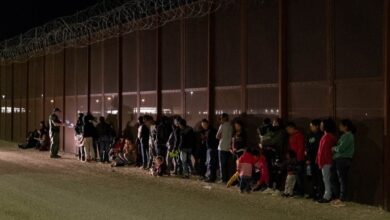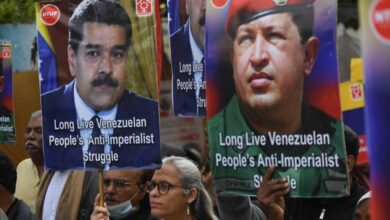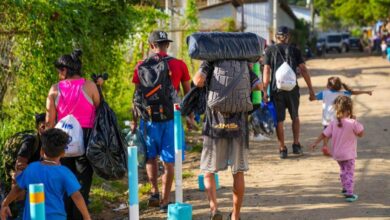Do Not Come: Is Biden’s New Immigration Policy Really That New?
Kamala Harris Has Visited Guatemala And Mexico to Consolidate Biden's Immigration Project.

The Democratic administration seeks a “humanitarian” solution in the medium term, rather than an aggressive solution to differentiate itself from its predecessor: Donald Trump. Photo: TW-KamalaHarris
LatinAmerican Post | Luis Hernández Liborio
Listen to this article
Leer en español: ¿Es Biden realmente una esperanza para los migrantes centroamericanos?
"I want to be clear with the people of this region that are thinking of making the dangerous trip to the US-Mexico border. Do not come, do not come." These were the forceful words of the Vice President of the United States, Kamala Harris, during her visit to Guatemala, which echo those pronounced by President Biden weeks ago. The Democratic administration seeks a "humanitarian" solution in the medium term, rather than an aggressive solution to differentiate itself from its predecessor: Donald Trump.
MIXED MESSAGES: In Guatemala, @VP Kamala Harris tells migrants "do not come" to the U.S.
But Homeland Security @SecMayorkas has said the opposite: "We are not saying 'don't come.'"
Meanwhile, border crossings remain the highest in 2 decades… #BidenBorderCrisis pic.twitter.com/HWYe4jHZxt
— Chad Gilmartin (@ChadGilmartinCA) June 7, 2021
What did the vice president agree with in Guatemala and Mexico?
Investment is the key word to describe the importance of Harris's trip. With Mexico, she agreed to work together to invest in Central America, mainly in the Northern Triangle (Guatemala, Honduras, and El Salvador). Mexico has the Comprehensive Development Plan for El Salvador, Guatemala, and Honduras with which it provides resources to young people and farmers trying to improve their conditions and avoid migrating north. This perspective fits with Biden's policy of attacking the problems that cause migration such as poverty and corruption, among others.
López Obrador se reúne con Kamala Harris en el Palacio Nacional para discutir el tema migratorio de México y Centroamérica.
Especial pic.twitter.com/y1rWOitHvq
— El Economista (@eleconomista) June 8, 2021
US investments will be focused on women's empowerment, housing construction, support for entrepreneurs, agrarian development, small and medium-sized businesses, according to the White House fact sheet. The resources will come from the United States government and private initiatives. In addition, support will be provided in legal terms to combat corruption, through international mechanisms to improve the effectiveness of law enforcement. This will also have an impact on the fight against migrant smuggling and human trafficking.
Trump's legacy
Trump's racist and radical discourse towards migrants was one of the characteristics of his government, accusing them of being part of the economic and security decline of their country. For this reason (in addition to the arrests and deportations) he maintained an aggressive immigration policy, whose crown jewel was the border wall with Mexico. Instead of seeking to solve underlying problems, the Republicans decided on a physical and technological wall that would stop migration.
In January 2019, the program known as "Remain in Mexico" emerged, aimed at sending asylum seekers to Mexico to await a response to their request, according to Human Rights Watch. This was born due to the increase in asylum applications between 2018 and 2019, mainly from the Northern Triangle, when arrests went from 396,579 to 851,508 according to data from the Customs and Border Protection (CBP). The crisis was (and still is) alarming. 64% of all detainees are entire families or unaccompanied children, some of them separated from their families, according to numbers from the Pew Research Center (PCR). And although Trump promised along with his Mexican counterpart, Andrés Manuel López Obrador, to support Central America economically, in the end, he did not keep his word.
You can also read: Why is Nayib Bukele so popular?
Therefore, it is not surprising that Vice President Harris' first trip abroad set in motion the machinery that will try to solve the migration problems of the United States, a matter of national security. Biden promised in the campaign to attack migration from a different perspective and with "humanitarian" actions, coinciding with López Obrador's project in Central America. Harris has visited Guatemala and Mexico to give seriousness to the project, but at the same time to give a clear message: The United States will not allow irregular migration and that will not change no matter who is in the presidency, or from which party they emanate.
The fine line between Trump and Biden's policy towards migrants
The departure of Trump from the presidency was a ray of hope for thousands of Central Americans who hoped for a transformation in immigration policy. However, Biden has made clear that order must prevail for those who wish to enter the United States. To make a difference, Biden commissioned Alejandro Mayorkas, Secretary of Homeland Security, to spearhead the reunification of separated families during the Trump administration. The secretary announced that 120 days after the commission began, they have achieved the reunion of 7 families and 29 more are in this process.
Today, the Family Reunification Task Force—including @DHSgov, @HHSgov, @StateDept and @TheJusticeDept released its 120-day progress report to @POTUS.https://t.co/rDGfwCNpwj pic.twitter.com/j6colhXI23
— Secretary Alejandro Mayorkas (@SecMayorkas) June 8, 2021
But inside the United States, the situation is not so simple, voices such as that of the Democratic congresswoman Alexandria Ocasio-Cortez have made themselves heard, criticizing the message of the vice president in Central America. She commented on Twitter that she was disappointed by the message, that requesting asylum at the border is totally legal and that the United States has played a destabilizing role in Latin America, so the waves of migration would be a direct consequence of that interference.
This is disappointing to see.
First, seeking asylum at any US border is a 100% legal method of arrival.
Second, the US spent decades contributing to regime change and destabilization in Latin America. We can’t help set someone’s house on fire and then blame them for fleeing. https://t.co/vADyh5H0bw
— Alexandria Ocasio-Cortez (@AOC) June 7, 2021
How far will Biden be able to distance himself from Trump's cold politics or from Barack Obama's? The change of government and Biden's measures that reversed Trump's policies did nothing more than increase the number of irregular migrants, as noted last March by Republican Senator Leader McConnell: CBP arrests are the highest in the last 20 Years, the migration crisis has deepened with the increase in cases of unaccompanied children. It will take time for the joint project with Mexico to work, the investment commitments and legal support made by the vice president in Central America will not have an immediate effect, so the border will probably continue to be a problem for voters in four or eight years.




